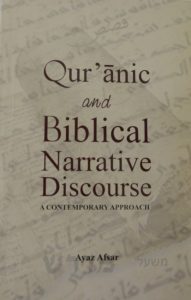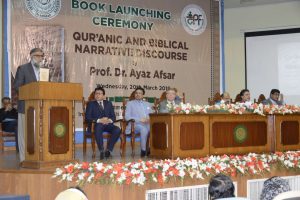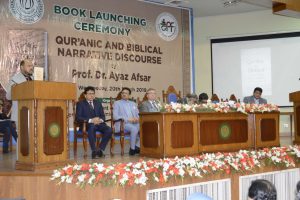
 The Department of English, in collaboration with the Contemporary Poetics Forum, International Islamic University, Islamabad, organised a book launch for Prof. Dr. Ayaz Afsar’s newly published book, Qur’ānic and Biblical Narrative Discourse: A Contemporary Approach.
The Department of English, in collaboration with the Contemporary Poetics Forum, International Islamic University, Islamabad, organised a book launch for Prof. Dr. Ayaz Afsar’s newly published book, Qur’ānic and Biblical Narrative Discourse: A Contemporary Approach.
Prof. Dr. Ayaz Afsar is the current dean of the Faculty of Languages and Literature art IIUI. His book, published by the Islamic Research Institute (IRI) at the International Islamic University, Islamabad, comes after numerous articles which he had previously published on the topic. It is an interdisciplinary study that makes use of literary and linguistic methods to compare and analyse the narrative elements of the Biblical and Qur’ānic texts.
IIUI Rector Dr. Masoom Yasinzai said that the book is a precious addition and such books are imperative to have impact of Islamic studies on worldly knowledge. He called upon academic fraternity to make it possible to initiate inter-disciplinary research .He said that the book is quite relevant to the vision of university as IIUI is striving to disseminate constructive thoughts of Islamic teachings. Research relevant to the Islamic perspective is the need of hour, he said.
IIUI Preside Dr. Ahmed Yousif Al-Draiweesh said the research productivity must be the core objective and the book is a salient laudable effort. He opined that books on Quran, its message and narrative with a contemporary approach are imperative to be published to foil the attempt of stereotype being created against Islam. He maintained that research output is the key to success in future.
Prof. Dr. Sebastian Gunther, a Germany based Islamic Studies scholar, was also present at the session and he stressed how Dr. Ayaz’s work focuses on the potential for understanding each other rather than on differences. He also appreciated Dr. Ayaz’s focus on the aesthetic and narrative structures of these texts.
 Dr. Husn ul Amin, the executive director of the Iqbal Institute for Research and Dialogue (IRD) discussed the book in context of the recent discussions in Qur’ānic studies, particularly those that have to do with the Qur’ān’s structure and style. He stated that Dr. Ayaz’s book is relevant to the students of Islamic Studies, Social Sciences, Literature, and Linguistics. Dr. Zia ul Haqq, the Director General IRI added to this by discussing the university’s academic work, especially with regards to the Islamic Sciences and in shaping a society.
Dr. Husn ul Amin, the executive director of the Iqbal Institute for Research and Dialogue (IRD) discussed the book in context of the recent discussions in Qur’ānic studies, particularly those that have to do with the Qur’ān’s structure and style. He stated that Dr. Ayaz’s book is relevant to the students of Islamic Studies, Social Sciences, Literature, and Linguistics. Dr. Zia ul Haqq, the Director General IRI added to this by discussing the university’s academic work, especially with regards to the Islamic Sciences and in shaping a society.
Earlier, In his welcome note by Dr. Muhammad Sheeraz, the chairman of the Department of English , who congratulated Dr. Ayaz and also discussed the importance of his work in context of the need for harmony in contemporary society. Mr. Farrukh Nadeem, a literary figure and faculty member at the department then proceeded to share his short review of the book, mentioning how it applies the literary methods of narratological study to the comparative study of religious texts. What the book does, he said, was to study the narrative structure and the aesthetic scheme of these texts, focusing on the how rather than on the what.
Dr Amal Sayyid, another faculty member at the department discussed the text in context of recent racial and religious conflicts and mentioned how it shows an alternative response that focuses on shared narratives rather than on difference. She also foregrounded the fact that Dr. Ayaz’s work does not try to liberalise Islam or to produce some sort of apologetic, but rather it acknowledges the narratives shared between faiths without sacrificing anything to the secular. She also mentioned how it goes beyond both post-modern approaches that begin with scepticism as well as those that fail to look at these texts as anything more than a rulebook.
The ceremony was hosted by Dr. Akhtar Aziz, who moderated the session and also gave it some context by quoting from both the Qur’ān as well as the Bible.
Copies of the book were also available for purchase and many students had them signed by Dr. Ayaz Afsar, who stayed there for as long as he could to facilitate those who wished to talk to him about his work.

